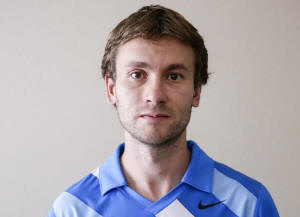|
WADA
showed flexibility with RUSADA reinstatement: Stepanov
 Send a link to a friend
Send a link to a friend
 [October 06, 2018]
By Karolos Grohmann [October 06, 2018]
By Karolos Grohmann
BUENOS AIRES (Reuters) - The World
Anti-Doping Agency's decision last month to reinstate the Russian
anti-doping agency (RUSADA) showed flexibility, said Russian
whistleblower Vitaly Stepanov on Friday.
Stepanov, a former employee of RUSADA and his wife, track and field
athlete Yulia, went public about doping in Russia back in 2014
triggering an avalanche of revelations.
Those led to a string of international investigations and a
three-year ban of RUSADA, the country's athletics team and
eventually the Russian Olympic team at the 2018 Winter Olympics
where some Russians competed as neutrals.
The Stepanovs had gone public with their revelations after WADA at
the time had failed to act on their information.
Since the scandal broke the Stepanovs, who fled from Russia for fear
of their lives, have been working closely with WADA.
"My personal feeling about the reinstatement of RUSADA is the fact
that WADA has shown the ability to be flexible and negotiate with
the side that committed sports crimes," Vitaly Stepanov told an
Olympic forum via Skype.

Gunter Younger, WADA's Director of Intelligence and Investigations,
said more whistleblowers were now coming forward in the wake of the
Stepanovs' co-operation, saying "400 cases were registered."
"We have many whistleblowers in Russia. It's the Russians who took
their system down and we have to help them to get back as athletes,"
he told the forum.
"More and more whistleblowers come and they say, 'Now we are happy
that we have someone that we can talk to.'
"I thought perhaps a few, but we have so many. We have 400 cases
registered," Younger, who said they were not all from Russia, added.
The Stepanovs have been living in an undisclosed location in North
America for fear of Russian reprisals. They have been branded as
traitors in their home country.
"Now I hope WADA will now fix the situation of many athletes who
have been robbed," Stepanov said.
[to top of second column] |

Russian Olympian Vitaly Stepanov poses for a picture before an
interview with Reuters at an undisclosed location on July 28, 2016.
Picture taken July 28, 2016. REUTERS/Isaiah J. Downing

RUSADA was suspended in 2015 after an independent WADA report
carried out by Canadian lawyer Richard McLaren outlined evidence of
massive state-backed, systematic doping and cover-ups in Russian
sport, allegations which Moscow denied.
But WADA readmitted it last month despite not fulfilling all
criteria, saying failure to allow access to stored samples in the
Moscow laboratory by year's end would lead to a renewed ban.
The decision was sharply criticized by some athletes and anti-doping
agencies.
Stepanov said it was not WADA that needed to act now but the
international federations. Only Russia's athletics federation
remains banned as a result of the scandal.
"The international federations are doing little to fight doping in
Russia," Stepanov, sitting next to his wife, said.
Although Russia has pledged to co-operate with global sports bodies
to curb the use of banned performance-enhancing drugs, the
authorities have vehemently denied the existence of state-sponsored
doping cover-ups.
"Those that run and govern sports must stop making deals that cover
up drugs use," Yulia Stepanova said.
"I would like to apologize for my past. Unfortunately I cannot
change it. I cheated and now I am talking about it. I regret not
speaking up sooner."
(Reporting by Karolos Grohmann; editing by Martyn Herman)
[© 2018 Thomson Reuters. All rights
reserved.] Copyright 2018 Reuters. All rights reserved. This material may not be published,
broadcast, rewritten or redistributed.
Thompson Reuters is solely responsible for this content.
 |